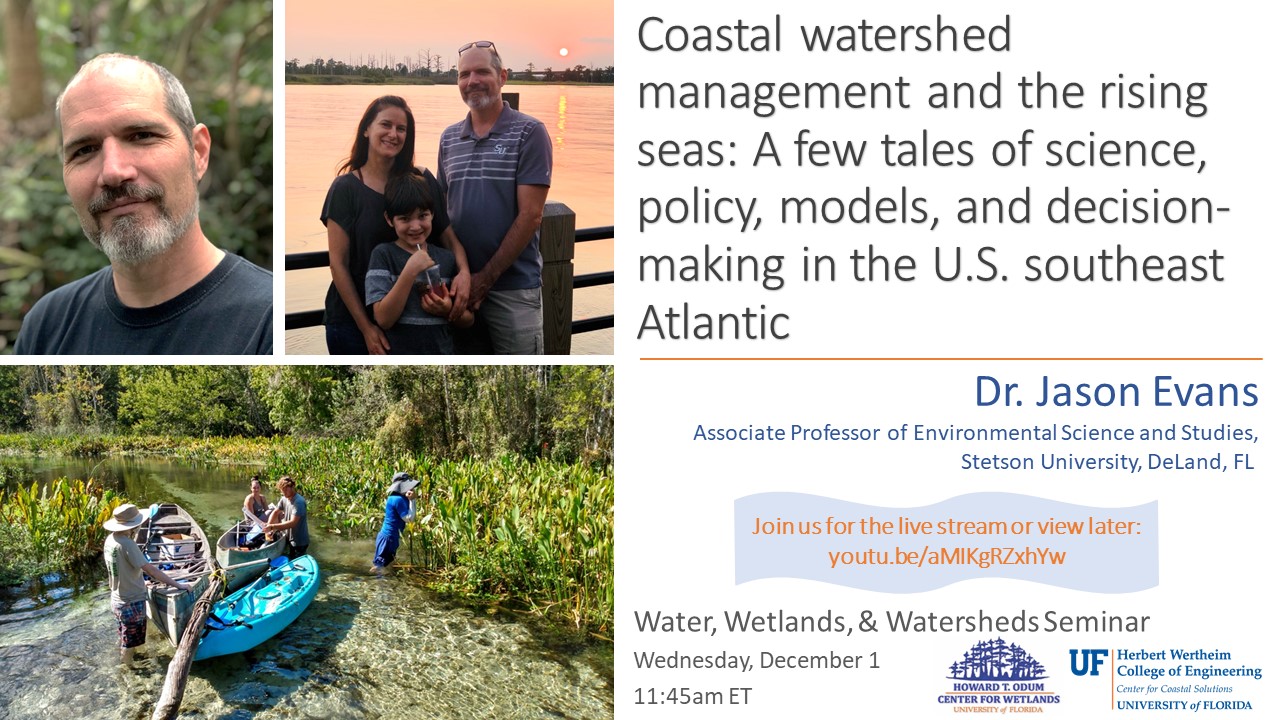December 1, 2021
 Coastal watershed management and the rising seas: A few tales of science, policy, models, and decision-making in the U.S. southeast Atlantic
Coastal watershed management and the rising seas: A few tales of science, policy, models, and decision-making in the U.S. southeast Atlantic
Jason Evans, Associate Professor of Environmental Science and Studies, Stetson University, DeLand, FL
Join us for the live stream Dec 1, 11:45am EST: https://youtu.be/aMIKgRZxhYw
(Please visit our youtube channel main page for the stream if there are any issues with the direct link.)
ABSTRACT
Coastal areas throughout the world are being impacted by an increasing rate of sea-level rise, as associated with anthropogenic global climate change. Because most of the U.S. southeast Atlantic coastline (including North Carolina, South Carolina, Georgia, and Florida) is low-lying with little elevational relief, it has long been known that natural and social systems in this region are highly vulnerable to stressors associated with sea-level rise. In recent years, this vulnerability has manifested as extensive land cover change, accelerated degradation/failures of key human infrastructure, and elevated flood risk in almost all southeast Atlantic coastal communities. Drawing on several case study projects developed through support from the NOAA Sea Grant College Program, this presentation describes some common challenges – as well as a few unique circumstances – faced by local governments, regional planners, state and federal policymakers, academic researchers, and individual citizens who are developing approaches for “adapting” to sea-level rise. Although there is a daunting degree of uncertainty associated with future sea-level rise, it seems clear that green infrastructure corridors for restoration and migration of coastal wetlands can provide “no-regrets” support for long-term socio-ecological resilience across a wide variety of projection scenarios. However, public policies that are based upon a paradigm of federally subsidized insurance to private property owners, maximization of local property tax revenues, and little to no accounting of ecosystem services in most land use decisions present ongoing barriers to the sustained implementation of sensible coastal planning interventions.
Bio
Dr. Jason Evans is the Executive Director of Stetson University’s Institute for Water and Environmental Resilience. A proud alum of UF’s Interdisciplinary Ecology program (M.S. 2002 and Ph.D 2007) who took many classes through the Center for Wetlands and Systems Ecology programs, Jason is now a leading researcher, practitioner, and teacher in the fields of coastal resilience and climate adaptation planning. Over recent years he has worked extensively on coastal hazards and habitat change assessment associated with sea level rise along the southeast Atlantic coasts of Florida, Georgia, South Carolina, and North Carolina, including multiple projects funded through NOAA’s Sea Grant and Coastal Zone Management programs. Jason also currently serves as Co-Editor-in-Chief for the Journal of Environmental Management, a top-ranked international publication within the fields of environmental science, engineering, planning, and governance.
POSTCARD
